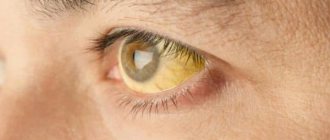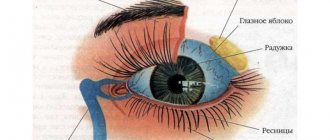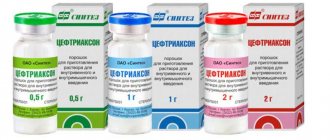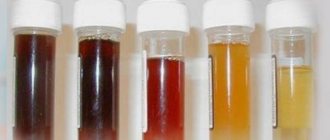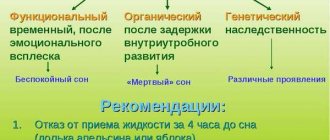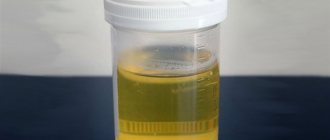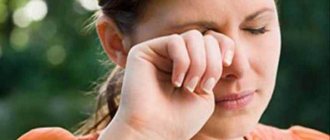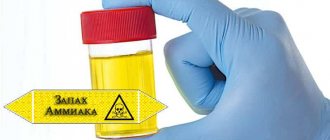Why is the baby crying?
In a newly born baby, the muscles of the genitourinary system are weak, so urination is a reflex and is not accompanied by discomfort. As the body develops, the muscles become stronger. If a newborn cries before going to the toilet, this symptom cannot be ignored.
Irritation
If the baby first cries and then pees, perhaps we are talking about irritation, which inevitably arises if parents forget to change the diaper in a timely manner. In this case, bowel movement is accompanied by burning and other unpleasant sensations. Observing basic hygiene standards will help solve the problem. If irritation has already appeared, you need to wash the child more often with warm water, and then use baby cream, powder and talc. For water procedures, you can use decoctions of chamomile and celandine - they have good anti-inflammatory properties. If you use soap, it should be baby soap or antibacterial. Adult detergents are not suitable as they can cause allergic reactions. The best prevention of irritation is timely diaper change.
Boy problems
If a male baby is capricious and cries before urinating, and the parents maintain hygiene when caring for him, the problem may be serious pathologies:
- phimosis;
- balanoposthitis;
- cystitis;
- pyelonephritis;
- testicular descent;
- urethritis.
Phimosis is considered to be anomalies in the development of the penis.
Phimosis is considered to be anomalies in the development of the penis, when the foreskin prevents the opening of the head. As a result, the emptying process becomes difficult. In addition, pain or inflammation may develop. In such a situation, you need to consult a specialist. Phimosis is usually treated with surgery.
With balanoposthitis, inflammation spreads to the head of the penis and the foreskin. Therapy is strictly mandatory and is carried out under the supervision of a specialist. Boys' testicles normally descend about a month after birth. If this does not happen, an examination is carried out at one year of age. When spontaneous prolapse does not occur, surgery is indicated for the small patient.
Pyelonephritis is a serious kidney disease that requires long-term treatment under the supervision of a nephrologist. A urologist will help cure urethritis and cystitis. If alarming symptoms appear, do not delay visiting a specialist. Timely assistance will help avoid serious complications and health problems.
Girl problems
When a newborn baby cries before emptying the bladder, we can talk about such pathologies as:
- inflammation of the vagina;
- urethral fusion;
- synechia;
- kidney diseases.
The most common cause is inflammation of the vagina. It can be caused by infection during childbirth, microtrauma, or failure to comply with simple hygiene standards. If it hurts a girl to pee, you should carefully examine her genitals. If there is yellow or green discharge, you should urgently show the baby to a gynecologist. The causative agent of the disease is pathogenic microorganisms that affect the mucous membrane and actively multiply. Then itching and burning sensation appear. When emptying, urine hits the inflamed area and causes pain, which is why the baby begins to cry. The result of inflammation can be a complication such as synechia - sticking together of the labia minora. At the initial stage, all disorders are easily eliminated, but if the disease is neglected, treatment will cause many problems.
The most common cause of newborn girls is inflammation of the vagina.
Cystitis and urethritis cause painful and frequent urination, burning, bad smelling urine and incontinence. If a girl is crying, check her urine before urinating. If it is cloudy and heterogeneous, there are visible impurities of blood or pus in it, we are talking about an infection. In this case, the newborn refuses to eat and his temperature rises. Such symptoms are a reason to visit a pediatrician.
Parasites
If a child is fed breast milk, the risk of infection with worms is minimal. Congenital invasions are excluded, since during pregnancy a woman undergoes regular examinations. However, a crawling child may grab onto surrounding objects that may contain parasite eggs.
Worm infestation is manifested by redness of the skin around the anus and unbearable itching. In girls, worms can move into the vagina and urethra. With enterobiasis, the female lays eggs in the folds of the perineum. This causes the newborn to cry before urinating. In girls, the symptoms of helminthic infestation are similar to allergic dermatitis or inflammation of the vagina - they also cause irritation and unpleasant discharge. Therefore, other signs are important: rash on the abdomen, high fever, cough, etc. If there is the slightest suspicion of helminth infection, you should undergo an examination and, if necessary, adequate therapy.
Important Factors
If your baby cries a lot and then urinates, don't panic. It is necessary to evaluate the child’s behavior: appetite and sleep, fever, etc. When the baby feels great, cries only before urinating, and then smiles, there is no need to worry. In such situations, the filling of the bladder simply frightens the baby, and crying is a signal for help. Over time, this phenomenon will disappear on its own. The frequency and volume of urination in children under one year of age are indicated in the table:
In newborn boys, the penis becomes tense when emptying. If the diaper is tight, discomfort may occur and, as a result, crying. To solve the problem, it is enough to change the diaper to a looser one and not tighten it too much. Sometimes the baby feels the urge to go to the toilet and, by crying, tells his mother about it. If a child's urine contains a lot of salts, a water imbalance occurs in the body, which causes irritation of the urinary tract. The baby is in pain and begins to cry. Therefore, it is important to give him enough fluids.
How to treat pain when urinating?
All types of pain when urinating in children require treatment, whether it is before, after or during deurination. The drugs are selected by the doctor based on the identified disease:
- Inflammations in the organs of the urinary system, cystitis and urethritis are treated with antiviral or antibacterial medications. Herbal baths and a special drinking regimen will be effective; in some cases, droppers with saline or other sorbents may be required;
- Kidney stone disease must be treated comprehensively, often with natural drugs of combined action. These include Canephron or Cystenal. When they are used, the stones are crushed and split, and the intensity of their release to the outside increases. Doctors recommend bed rest, minimal activity, and warm baths to relieve the condition;
- In cases of foreign objects entering the urethra, it is necessary to remove them, and then use local anesthetics to relieve pain. The doctor prescribes a set of antibacterial medications to prevent infection;
- Vesicopelvic reflux requires minimally invasive surgical intervention, in particular, fixation of part of the ureter using endoscopic methods. As a temporary measure, the doctor prescribes antispasmodics.
More on the topic: Why can red blood cells be elevated in a urine test according to Nechiporenko?
All treatment for pain during deurination consists of taking medications, drinking large amounts of water, strict diet and bed rest. Only with such careful attention and comprehensive treatment can a quick and reliable recovery be achieved, complications avoided and the lives of children made brighter and calmer.
Signs of deviations from the norm
If a child is capricious before urinating, it may be painful for him to pee, and in this way he expresses his feelings:
- Children under one year of age do not participate in the emptying process. But when discomfort appears, the newborn cries, gets nervous and draws in his legs.
- Babies two to three years old have bowel movements without much worry. When pain occurs, crying and straining are noted. The baby can show where it hurts, or refuses to write at all.
- A child over three years old can talk about his feelings and point to his genitals. Some children, once they feel pain when urinating, do not allow themselves to sit on the potty.
If it hurts your baby to pee, it is most likely due to inflammation.
If it hurts your baby to pee, most likely it is due to inflammation. In this case, symptoms such as pain, burning, false urges, and abdominal pain are noted. You need to tell your pediatrician about all this.
How to recognize the disease?
It is quite difficult to determine the symptoms, given that the baby cannot always point to the place where it hurts, but continues to cry. Newborns simply cry before deurination or during urination, make sudden movements or scream.
Until they reach three years of age, parents have no way of understanding the child’s condition, but as they grow older, they begin to point at the genital area, may hold them in their hand, run away from the toilet, and in other ways show their reluctance to go to the toilet due to pain. Older children will already be able to clearly explain where the pain is and how they feel it. Pinching, burning, cutting or pulling, this is how children most often describe their condition.
All urological diseases in children cause pain during deurination, and are also accompanied by a number of symptoms, including:
- When the urinary tract becomes infected, a burning sensation, pain, and pain appear in the urethral canal. The baby often urinates without even reaching the toilet. All portions of the released liquid are extremely small, even a few drops, but have a strong and unpleasant odor. Against this background, children’s temperature rises, vomiting or nausea begins, and their appetite deteriorates. If cystitis is detected in severe form, then blood and pus appear in the urine;
- Urolithiasis is also accompanied by hematuria and pyuria. Pain not only in the genitals, but also in the lower back, inside the thighs, and in the abdomen. The pain syndrome is similar to colic, just as sudden and extremely acute. Parents note that the child becomes weak and lethargic, and nausea appears. If the baby takes a position on his side, then his condition improves, the intensity of colic decreases;
| № | Helpful information |
| 1 | Reflux of the vesicopelvic type provokes pain in the lower back, but babies rarely indicate this, always pointing to the stomach. There are no difficulties with deurination, but the urge is frequent, without pain. The pathology occurs chronically all the time, but during exacerbations the child cries when urinating, shuddering from sudden discomfort |
More on the topic: How does the color of urine change with hypochromuria?
When to go to the doctor
The reasons why a newborn begins to cry are varied and largely depend on the gender of the child. Sometimes there is no reason to worry - it is enough to change the diaper more often and carefully observe hygiene. But sometimes such a symptom indicates the development of serious diseases that require medical intervention.
Before going to the doctor, observe the baby and evaluate his well-being:
- measure the temperature;
- Offer the baby something to eat - perhaps the crying is caused by a feeling of hunger;
- remember how much the child slept over the last 24 hours - maybe he was just tired;
- inspect the skin under the diaper - it may become inflamed and, as a result, hurt when urinating;
- Wash the baby and place a white diaper under him, wait until he has emptied, and evaluate the color and smell of the urine.
Quite often, symptoms indicate the development of serious diseases requiring medical intervention.
If, in addition to crying, rashes and genital irritation are observed, it is worth taking the child to the pediatrician.
He determines the cause of the problems through a set of studies. First of all, you will need to submit your urine for analysis, collecting it in a sterile container. Sometimes an ultrasound examination is performed. In boys, it is recommended to take a flora scraping from the genital organs - it allows you to determine the presence of microbes in the urethra.
Therapy is aimed at eliminating the cause that provoked the discomfort. for inflammation, antibacterial and antiviral drugs are prescribed, as well as baths with the addition of medicinal herbs. Sometimes droppers using saline and sorbents are prescribed. Fusion of the labia requires surgery. Phimosis goes away by the time of puberty or is eliminated surgically. It is very important to follow all the specialist’s prescriptions: follow the recommended dosage, time intervals between taking the medicine, duration of the course.
Hygiene of newborns as prevention
In the first months of a child's life, hygienic care is limited to washing the child after he poops, as well as daily bathing.
Chlorinated water can cause irritation; it is best to avoid washing with it. Boiled water is better suited for these purposes. You should not wash your child with soap too often; you should use more water when bathing or washing. Soap or bathing gel used too frequently can lead to an imbalance in the microenvironment of the skin and genitals.
Hygiene rules
The cause of infants crying before urinating can be various inflammations. To eliminate them, as well as for preventive purposes, it is important to follow simple hygiene rules. In the first months, care consists of washing the newborn after each bowel movement, as well as daily bathing. It is best to use boiled water, baby or hypoallergenic soap. A mild antiseptic is ideal for washing. You can add chamomile infusion to the baths. To prevent the accumulation of bacteria in the urinary system and high concentrations of urine, provide your child with plenty of water.
A baby's crying that occurs before emptying the bladder is a common whim, but it can also be a symptom of serious disorders. Therefore, it is better to show the child to a doctor who will help identify the problem and quickly eliminate it.
Causes of pain during urination
The child cries before or during urination with the following diseases:
- Cystitis. The mucous membrane of the bladder becomes inflamed, children often ask to go to the toilet, but a very small amount of fluid is released. This is always accompanied by pain, and a bacterial infection also develops;
- Kidney stone disease can be due to a failure in the endocrine system, a hereditary factor, an excess or lack of certain vitamins, problems with the outflow of urine, etc. The formed stone can be in the urethral canal, where blood clots, bacteria and fibrin are retained. The baby always struggles during deurination; he tries not to move so as not to cause a new attack of pain;
- Reflux of the vesicopelvic type causes urine to flow back into the pelvis of the kidneys from the bladder cavity. The sphincter, which in a healthy person restrains the reverse flow of urine, does not work and contracts in the wrong way. This may be a consequence of a congenital type of pathology, and may also appear over time in the urinary tract due to the development and spread of infection and inflammation.
- Vulvovaginitis and synechiae (fusion of the female labia) also cause pain when emptying the bladder. In practice, boys experience obstruction of the channel for urine output, as well as inflammation in the area of the head of the penis.
More on the topic: How to cure chronic urinary retention?
